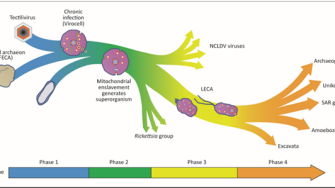Seminar Series: Eukaryogenesis
Dr Philip Bell from Microbiogen presented his hypothesis involving viral eukaryogenesis to the ACA.
Dr Philip Bell from Microbiogen presented his hypothesis involving viral eukaryogenesis to the ACA.

A major question in the evolution of life as we know it is how eukaryotes (complex cellular life) formed. Dr Philip Bell from Microbiogen presented his hypothesis involving viral eukaryogenesis to the ACA.
Watch Dr Bell’s seminar on the ACA YouTube channel, here.
Presentation: ‘Eukaryogenesis: the rise of an emergent superorganism.’
Abstract: Understanding the origin of the deep evolutionary chasm between the eukaryotes and prokaryotes remains unresolved. The Viral Eukaryogenesis (VE) hypothesis proposes a model in which the eukaryotes originated as an emergent superorganism rather than evolving via descent with incremental modification from the Last Universal Common Ancestor (LUCA). According to the VE hypothesis, the eukaryotic nucleus descends from a viral factory, the mitochondrion descends from an enslaved alpha-proteobacteria, and the cytoplasm, ribosomes, and plasma membrane descend from an archaeal host. A virus initiated the eukaryogenesis process by colonising an archaeal host to create a virocell that had its metabolism reprogramed to support the viral factory. Subsequently, viral processes facilitated the entry of a bacterium into the archaeal cytoplasm which was also eventually reprogramed to support the viral factory. As the viral factory increased control of the consortium, the archaeal genome was lost, the bacterial genome was greatly reduced, and the viral factory eventually evolved into the nucleus. It is proposed that the interaction between these three simple components generated a superorganism whose emergent properties allowed the evolution of eukaryotic complexity. Invoking viruses as the key to understanding the origin of the eukaryotes challenges several mainstream biological paradigms since viruses are deemed non-living and cannot be placed on the universal Tree of Life. If the radical tenets of the VE hypothesis are ultimately accepted, current biological paradigms regarding viruses, cell theory, LUCA, and the universal Tree of Life should be fundamentally altered or completely abandoned. In this talk the VE hypothesis is outlined and updated in light of recent scientific advances.
Presenter biography:
Dr Philip Bell completed a double major in Geology (USyd) and worked as an exploration geologist in north west Queensland prior to changing academic direction and ultimately obtaining a Ph.D in Biochemistry and Molecular Genetics from UNSW. He has published over 25 peer reviewed publications in fields ranging from yeast genetics, flow cytometry, fluorescent probes, corn ethanol production and the origin of the eukaryotes. He co-founded Microbiogen in 2000 with Dr Paul Attfield with the aim of using quantitative genetic principles to improve the performance of yeast under industrial conditions. He is currently Director of Research at Microbiogen, where he has successfully led programs to develop and commercialise improved yeast biocatalysts for biofuel production. Microbiogen has received awards such as Australian Exporter of the Year as well as major grants including an Australian Renewable Energy Grant (ARENA) to develop world leading biocatalysts for producing ethanol from lignocellulosic waste materials such as sugarcane bagasse.